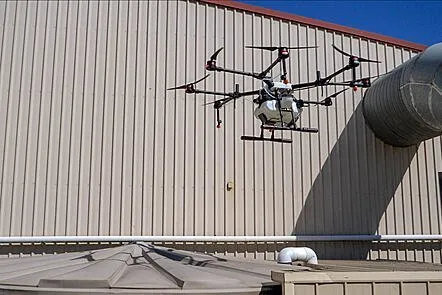
Drones and Autonomous Systems 2: Applications in Emergency Management 
This Professional Certificate provides the foundational knowledge needed to become a technology specialist in the field of drones and autonomous systems. It is designed to help those who wish to use cutting edge systems to reduce disaster losses and save lives. ▼
ADVERTISEMENT
Course Feature
![]() Cost:
Cost:
Free
![]() Provider:
Provider:
Edx
![]() Certificate:
Certificate:
No Information
![]() Language:
Language:
English
![]() Start Date:
Start Date:
28th Apr, 2021
Course Overview
❗The content presented here is sourced directly from Edx platform. For comprehensive course details, including enrollment information, simply click on the 'Go to class' link on our website.
Updated in [March 06th, 2023]
This Professional Certificate provides foundational knowledge for those who want to become technology specialists who can procure and gain insight into cutting edge systems to help save lives and cut disaster losses. It is designed for recreational hobbyists, certified remote pilots, commercial operators, and public safety and government users.
The course covers unmanned aerial systems (UAS) to include drones and autonomous aerial vehicles, sensors, communications, ground control, navigation and other payloads that rely on complex algorithms that can be applied for protecting and saving lives and property. It will teach the importance of autonomous systems and drone technologies that bring speed, efficiency and affordable solutions to disaster response and management.
Topics include the use of drones by emergency managers, first responders, and search and rescue personnel responding to natural and manmade disasters. No previous knowledge of drones or flight experience is required.
The course is taught by highly experienced instructors and practitioners in military and civil UAS operations, practical applications, systems design, and emergency management planning. It will provide the novice, subject-matter expert analyst, planner and operational associate with the technical understanding for infusing drone solutions into emergency management and planning.
Those who have a curiosity or general interest in drones, be it casual or in-depth, will benefit from this course to gain insight into emergency management, homeland security, and intelligence applications.
[Applications]
Upon completion of this course, participants will be able to apply the knowledge gained to develop strategies for integrating drones and autonomous systems into emergency management and planning. They will be able to identify the advantages and limitations of drones and autonomous systems in emergency management and planning, and understand the legal and ethical considerations for their use. Participants will also be able to develop strategies for using drones and autonomous systems to support emergency management and planning operations.
[Career Paths]
Job Position Paths:
1. Drone Pilot: Drone pilots are responsible for operating unmanned aerial vehicles (UAVs) for a variety of purposes, including surveillance, search and rescue, and emergency management. Drone pilots must be knowledgeable in the operation of the drone, as well as the laws and regulations governing their use. The demand for drone pilots is expected to grow as the technology becomes more widely used in a variety of industries.
2. Autonomous Systems Engineer: Autonomous systems engineers are responsible for designing, developing, and testing autonomous systems, such as drones and robots. They must have a strong understanding of robotics, computer science, and engineering principles. Autonomous systems engineers must also be knowledgeable in the laws and regulations governing the use of autonomous systems. The demand for autonomous systems engineers is expected to grow as the technology becomes more widely used in a variety of industries.
3. Emergency Management Specialist: Emergency management specialists are responsible for developing and implementing plans to respond to natural and man-made disasters. They must have a strong understanding of emergency management principles and be knowledgeable in the laws and regulations governing emergency management. The demand for emergency management specialists is expected to grow as the need for emergency preparedness and response increases.
4. Search and Rescue Technician: Search and rescue technicians are responsible for responding to emergency situations and providing assistance to those in need. They must be knowledgeable in the use of search and rescue equipment, such as drones, and be familiar with the laws and regulations governing their use. The demand for search and rescue technicians is expected to grow as the technology becomes more widely used in a variety of industries.
[Education Paths]
Three degree paths that are recommended for learners of this course are:
1. Bachelor's Degree in Emergency Management: This degree program provides students with the knowledge and skills needed to effectively manage emergency situations. It covers topics such as disaster preparedness, response, recovery, and mitigation. Students will also learn about the legal and ethical considerations of emergency management, as well as the principles of risk assessment and communication. Additionally, this degree program will provide students with the opportunity to gain hands-on experience in emergency management through internships and fieldwork.
2. Master's Degree in Autonomous Systems: This degree program focuses on the development and application of autonomous systems, such as drones, robots, and other unmanned vehicles. Students will learn about the design, programming, and operation of autonomous systems, as well as the ethical and legal implications of their use. Additionally, this degree program will provide students with the opportunity to gain hands-on experience in the development and application of autonomous systems through internships and fieldwork.
3. Doctoral Degree in Disaster Management: This degree program provides students with the knowledge and skills needed to effectively manage disasters. It covers topics such as disaster preparedness, response, recovery, and mitigation. Students will also learn about the legal and ethical considerations of disaster management, as well as the principles of risk assessment and communication. Additionally, this degree program will provide students with the opportunity to gain hands-on experience in disaster management through internships and fieldwork.
The development trends for these degree paths are focused on the use of technology to improve emergency management and disaster response. This includes the use of drones, autonomous systems, and other advanced technologies to improve the speed and efficiency of disaster response. Additionally, there is an increasing focus on the ethical and legal implications of the use of these technologies, as well as the principles of risk assessment and communication.
Course Provider

Provider Edx's Stats at AZClass
Learners of Drones and Autonomous Systems 2: Applications in Emergency Management gain a comprehensive understanding of the use of drones and autonomous systems in emergency management. They will understand the importance of these technologies in providing speed, efficiency and cost-effective solutions for disaster response and management. The course will cover topics such as the use of drones by emergency managers, first responders, and search and rescue personnel in response to natural and man-made disasters. Learners will also gain insight into the technical aspects of drone operation such as sensors, communications, ground control, navigation, and other payloads that rely on complex algorithms.
Discussion and Reviews
0.0 (Based on 0 reviews)
Explore Similar Online Courses

Comprehensive Guide to Final Cut Pro: Part Three

Learn to Write What Ranks (SEO Blogging)

Python for Informatics: Exploring Information

Social Network Analysis

Introduction to Systematic Review and Meta-Analysis

The Analytics Edge

DCO042 - Python For Informatics

Causal Diagrams: Draw Your Assumptions Before Your Conclusions

Whole genome sequencing of bacterial genomes - tools and applications

The Ultimate Guide for Land Surveying with Drones - Part 1

Drone Safety for Managers (Latin America)


Start your review of Drones and Autonomous Systems 2: Applications in Emergency Management